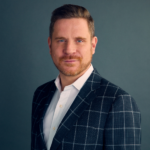Insights
Clyde Deskside: A Conversation with Alex Slater, Founder and CEO of Clyde Group.

“Our motivation should be creating a sense of societal empowerment. In this way, I see our role as not just communicators, but as agents of social change.”
Welcome to Clyde Deskside, a new series of Q&A-style interviews where we’ll be introducing readers to our senior advisory team. Over the next few months, we’ll be sitting down with the men and women who are leading Clyde Group today, talking with them about their professional life and personal journey. Our hope is that these conversations can shed some light on how Clyde Group operates as the best agency to work for and the best agency to work with, as well as where the future of the industry is headed. To get us started off, we thought it made sense to start at the top.

Founder and CEO
Clyde Group
Alex Slater is the founder and CEO of Clyde Group, an award-winning strategic communications and public affairs agency named North America’s Best Boutique Agency of the Year by PRovoke in 2021 and 2022 and the recipient of the 2022 “Award of Excellence” in the Boutique category from PRSA Anvil Awards. Slater, a gay immigrant to the U.S. from Scotland and France, is also a recognized activist and human rights leader. He is a member of multiple boards including the Victory Fund, Whitman Walker Health, Asylum Works, and the Leslie-Lohman Museum of Art, the world’s leading collection of LGBTQ+ art. Slater holds a master of arts degree in Communications from the Annenberg School at the University of Pennsylvania and bachelor of arts and master of arts degrees from the University of Cambridge, where he was president of the Cambridge Union. He lives in Washington, D.C.
Tell us about your career journey. What did it teach you?
At first, I wanted to be a journalist. But when I got out of school, I started in communications and learned that I preferred making the news instead of reporting it. Something I’ve always wondered is if I made the right decision, but it has led to a really fulfilling career.
The evolution of my career has been surprising to me. I always thought I’d thrive best as a “cog” — albeit an important one — in a larger agency or company. If you asked me 20 years ago if I wanted to run my own firm, I don’t think I would have seen that in the cards. But since founding Clyde Group eight years ago, I’ve come to know myself better and I love it. I like to lead an institution and its culture, and I get to choose the best-in-class advisers around me. Overall this experience has taught me that I’m more resilient and entrepreneurial than I thought.
What would you tell your younger self about what you know now?
"Our motivation should be creating a sense of societal empowerment. In this way, I see our role as not just communicators, but as agents of social change."
Alex Slater
Founder and CEO, Clyde Group
This answer deserves a prize for lack of originality, but I would tell my younger self to take more risks. And I think my older self will probably tell my present self the same thing!
What is your favorite part of working at a PR agency?
The variety of the work and clients. It’s stressful and requires flexibility but I never tire of how different my days can be. One minute you’re talking to a Fortune 100 CEO about their company’s share of voice in the market and the next minute you can be dealing with a small startup in crisis because of their engagement on social justice issues.
What advice would you give company leaders who are trying to improve their external communications?
I think it's best to focus on outcomes over outputs. A lot of communications professionals can get lost in outputs — that can be generating press releases, blog posts, and content. Whereas at Clyde Group, one of our great principles is outcomes over outputs. So yes, we celebrate those outputs but they are a means to an end — achieving clear outcomes, whether those are increasing share of voice, passing a piece of legislation, or avoiding a crisis. We can lose sight of the ultimate goal — it’s something we come back to again and again.
What aspect of the PR/comms industry has changed the most drastically over your career?
It’s inescapable that we focus on the digital ascendancy of our profession. During the first year I started we were still faxing press releases in London to journalists. And when I was working on my first journalism assignment our fax machine was literally positioned next to the recycling bin — every press release would just drop into the trash because there were just so many of them. So technology has changed the baseline way we communicate with each other and our clients. And it also opened up endless ways of communicating with complete precision to the audiences that we try to move. It’s allowed us to identify them and what moves them.
How do you see the PR industry changing over the next five years?
Recently there’s been a noticeable change in where comms sits in terms of corporate and organization leaderships or importance. That accelerated during the pandemic when every organization had to become communications pros internally and externally, whether they liked it or not. If anyone thought that was going to go back to the way it was post-pandemic, that has not been the case. We’ve seen a permanent restructuring of how important comms is in organizations to a point where we weren't in the C-suite before but we are now. And we’ll be there even more so over the next five years.
What trends in DE&I have you seen recently that are most interesting to you? Why?
Since George Floyd, we’ve constantly been told — by the comms industry and some of our clients — that we are entering the era of accountability. But where’s the proof? This seems to be pushing our real responsibility further out from substantive change and improvement, for example, in terms of reporting demographics or making sure our clients are truly reaching underserved populations.
As communicators, our first instinct is to present things in their best possible light. But I think we’re still struggling as an industry to reconcile that instinct with the actual need of showing authenticity and vulnerability around diversity, equity, inclusion — and again — accountability. It’s not enough to say “there’s always more work to be done.” Accountability means also talking about and taking responsibility for the negative.
Our motivation should be creating a sense of societal empowerment. In this way, I see our role as not just communicators, but as agents of social change. My call to the industry is this — let’s hold ourselves to higher standards than simple spin doctors.
What’s your most proud career moment/accomplishment thus far?
I’m proud of what we’ve done at Clyde with our vision of being the best to work for and the best to work with. And the industry agrees, with the awards we’ve received recently as PRovoke’s Best Boutique Agency of the Year two years in a row, along with the 2022 PRSA Award of Excellence. But that’s not the main reason to do it. I always saw an opportunity for richer client engagement, where we care as much as clients about the outcomes they are seeking to achieve. And richer team member engagement than at other agencies and at other places to work.
What's the best book you've ever read?
“Principles” by Ray Dalio. One of the principles I really learned about is feedback, which is why it's central to Clyde Group. I think it’s fascinating to me how many communicators have trouble communicating to give each other feedback. In fact, it is one of the hardest things to do, as we’ve discovered in our internal culture surveys at Clyde Group. But it’s an essential effort in making our company better and getting better results too.
Most overused jargon in PR?
It’s not jargon exactly, but the way we overuse the words “strategy” and “strategic.” They’re routinely misused across the industry. Strategy is something leaders or consultants offer as a service without understanding its actual meaning. At many professional services firms, just using the word passes for implementing the concept. In that way strategy has become a catchall that often and unwittingly conceals the fact that no real strategy exists.
What do you do for fun in your free time?
I don’t have a lot of free time. But my family is everything to me. Period. I grew up in Scotland and my mother is French — I’m lucky enough to carry three passports. So I try to go back to see my family as often as I can. Remote work has made that so much easier too. If I can work a full day from 3,000 miles away and have lunch and dinner with my mother, that’s a win for me.